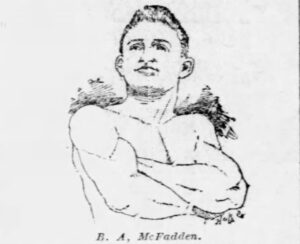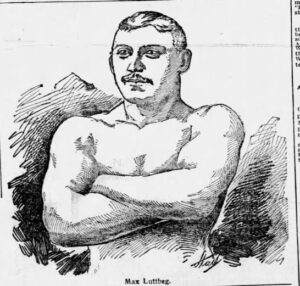Bernarr MacFadden in Saint Louis
Bernarr MacFadden, born Bernard Adolphus McFadden in Mill Spring, Missouri, on August 16, 1868, founded a publishing company in 1899 that still operates today. MacFadden, an early proponent of physical culture, authored books and published magazine about physical culture, early bodybuilding training. MacFadden moved into pulp magazines like True Detective in the 1920s.
Before MacFadden made his fortune as a publisher in the Northeastern United States, he was Barney McFadden, a skilled lightweight Greco-Roman wrestler in St. Louis from 1890 to January 1894. McFadden wrestled as B.A. McFadden in St. Louis.

Artist rendering of lightweight Greco-Roman wrestler B. A. McFadden in St. Louis. McFadden later became the publisher Bernarr MacFadden (Public Domain)
Both McFadden’s parents died by the time McFadden was eleven years old. McFadden worked on a farm for two years before moving to St. Louis in 1881. McFadden worked an office job for the next three years. McFadden thought the sedentary work turned him into an invalid at only 16 years old.
McFadden embarked on a physical culture regimen which restored McFadden’s health. McFadden started advocating for the physical culture lifestyle. McFadden testified in front of the Missouri House and Senate advocating for legislation to include physical culture in public school education.
On New Year’s Eve 1893, Sunday, December 31st, McFadden wrestled Martin Muldoon, the younger brother of William Muldoon, the World Heavyweight Greco-Roman Wrestling Champion from 1880 to 1889. Martin Muldoon agreed to throw McFadden twice in one hour or concede the match to McFadden. Muldoon did not throw McFadden once during the hour long match.
By this time, the 25-year-old McFadden authored a book on physical culture and intended to start publishing physical culture magazines. McFadden thought wrestling led to imbalanced development. McFadden told the St. Louis Post-Dispatch that he would soon retire to devote all his time to the spread of physical culture.
Before McFadden left for New York and the realization of his publishing dreams, McFadden wanted to avenge his only loss as a professional wrestler in St. Louis. Max Luttbeg, a catch-as-catch-can wrestling specialist, defeated McFadden in second of their two earlier matches. The men wrestled to a draw in the first match. McFadden wanted to avenge the loss before leaving St. Louis.
McFadden wrestled Luttbeg in a best two-out-of-three-falls match with a two-hour time limit. The men agreed that if either wrestler scored only one fall during the two-hour time limit, the winner of the fall would be the winner of the match.
The rivalry drew 2,000 fans to St. Louis’s Music Hall on Saturday, January 27, 1894. 2,000 fans constituted a huge crowd for a St. Louis wrestling match in the 1890s.
Luttbeg announced to the crowd that he sprained his knee prior to the match. Luttbeg said if he lost the match, Luttbeg would accept the decision. However, Luttbeg said he wanted a rematch with McFadden at 133 pounds. Fans booed Luttbeg’s statement as the preemptive excuse it was.

Artist rendering of Max Luttbeg, catch-as-catch-can wrestling instructor and part-time pro wrestler in 1893 (Public Domain)
McFadden weighed 142 pounds. Luttbeg weighed 127 pounds. McFadden and Luttbeg wrestled on mats on the stage of the Music Hall.
McFadden grabbed a single leg for an attempted takedown, but McFadden grabbed the hold too close to the footlights. The referee made them return to the center of the mat. Luttbeg spun out of the hold.
McFadden moved back in for a takedown when fans heard a sickening thud. Luttbeg yelled that McFadden fouled Luttbeg by head butting. The referee disagreed and told them to continue wrestling.
Luttbeg responded by elbowing McFadden in the jaw. McFadden told Luttbeg if Luttbeg fouled him again, McFadden would pound Luttbeg with his fist.
Luttbeg struggled to keep McFadden off him. Luttbeg decided to end the match early by applying a stranglehold. The agreement for the match clearly banned the use of the stranglehold. Luttbeg knew his actions would lead the referee to disqualify him.
Luttbeg used the front face lock (stranglehold) to lift McFadden off ground while the referee tried to pry Luttbeg off McFadden. McFadden punched Luttbeg in the stomach repeatedly as McFadden applied pressure to Luttbeg’s forearm. McFadden used the forearm pressure to keep Luttbeg from choking him out.
Six men pried Luttbeg off McFadden as the crowd surged toward the footlights threatening to riot. McFadden showed the fans the bruises on his neck further angering the fans. The referee disqualified Luttbeg and ended the match to prevent further antagonizing of the crowd.
Fans booed Luttbeg as he left. Luttbeg tried to say the stranglehold was a legal wrestling hold and that he only agreed to the ban to make the match. The fans booed what they saw as excuse making.
Luttbeg never got his rematch. McFadden left St. Louis in February 1894 for New York. McFadden stayed in New York, changed his name to Bernarr MacFadden because McFadden thought it sounded stronger, and started publishing Physical Culture magazine. MacFadden called an end on his wrestling career.
You can leave a comment or ask a question about this or any post on my Facebook page.
Sources: St. Louis Post-Dispatch (St. Louis, Missouri) January 1, 1894, p. 7 and January 28, 1894, p. 8
Pin It
